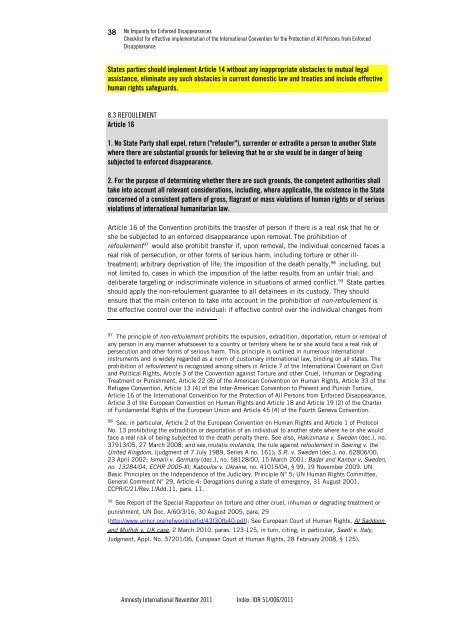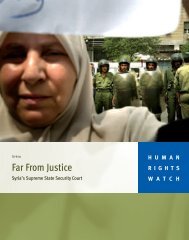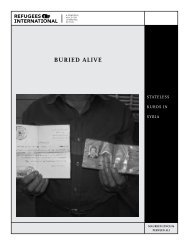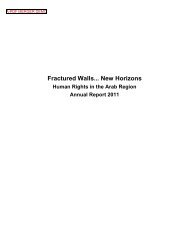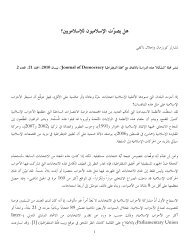No impuNity for eNforced disappearaNces - Amnesty International
No impuNity for eNforced disappearaNces - Amnesty International
No impuNity for eNforced disappearaNces - Amnesty International
Create successful ePaper yourself
Turn your PDF publications into a flip-book with our unique Google optimized e-Paper software.
38<strong>No</strong> Impunity <strong>for</strong> En<strong>for</strong>ced DisappearancesChecklist <strong>for</strong> effective implementation of the <strong>International</strong> Convention <strong>for</strong> the Protection of All Persons from En<strong>for</strong>cedDisappearanceStates parties should implement Article 14 without any inappropriate obstacles to mutual legalassistance, eliminate any such obstacles in current domestic law and treaties and include effectivehuman rights safeguards.8.3 REFOULEMENTArticle 161. <strong>No</strong> State Party shall expel, return ("refouler"), surrender or extradite a person to another Statewhere there are substantial grounds <strong>for</strong> believing that he or she would be in danger of beingsubjected to en<strong>for</strong>ced disappearance.2. For the purpose of determining whether there are such grounds, the competent authorities shalltake into account all relevant considerations, including, where applicable, the existence in the Stateconcerned of a consistent pattern of gross, flagrant or mass violations of human rights or of seriousviolations of international humanitarian law.Article 16 of the Convention prohibits the transfer of person if there is a real risk that he orshe be subjected to an en<strong>for</strong>ced disappearance upon removal. The prohibition ofrefoulement 97 would also prohibit transfer if, upon removal, the individual concerned faces areal risk of persecution, or other <strong>for</strong>ms of serious harm, including torture or other illtreatment;arbitrary deprivation of life; the imposition of the death penalty, 98 including, butnot limited to, cases in which the imposition of the latter results from an unfair trial; anddeliberate targeting or indiscriminate violence in situations of armed conflict. 99 State partiesshould apply the non-refoulement guarantee to all detainees in its custody. They shouldensure that the main criterion to take into account in the prohibition of non-refoulement isthe effective control over the individual: if effective control over the individual changes from97The principle of non-refoulement prohibits the expulsion, extradition, deportation, return or removal ofany person in any manner whatsoever to a country or territory where he or she would face a real risk ofpersecution and other <strong>for</strong>ms of serious harm. This principle is outlined in numerous internationalinstruments and is widely regarded as a norm of customary international law, binding on all states. Theprohibition of refoulement is recognized among others in Article 7 of the <strong>International</strong> Covenant on Civiland Political Rights, Article 3 of the Convention against Torture and other Cruel, Inhuman or DegradingTreatment or Punishment, Article 22 (8) of the American Convention on Human Rights, Article 33 of theRefugee Convention, Article 13 (4) of the Inter-American Convention to Prevent and Punish Torture,Article 16 of the <strong>International</strong> Convention <strong>for</strong> the Protection of All Persons from En<strong>for</strong>ced Disappearance,Article 3 of the European Convention on Human Rights and Article 18 and Article 19 (2) of the Charterof Fundamental Rights of the European Union and Article 45 (4) of the Fourth Geneva Convention.98See, in particular, Article 2 of the European Convention on Human Rights and Article 1 of Protocol<strong>No</strong>. 13 prohibiting the extradition or deportation of an individual to another state where he or she wouldface a real risk of being subjected to the death penalty there. See also, Hakizimana v. Sweden (dec.), no.37913/05, 27 March 2008; and see,mutatis mutandis, the rule against refoulement in Soering v. theUnited Kingdom, (judgment of 7 July 1989, Series A no. 161); S.R. v. Sweden (dec.), no. 62806/00,23 April 2002; Ismaili v. Germany (dec.), no. 58128/00, 15 March 2001; Bader and Kanbor v. Sweden,no. 13284/04, ECHR 2005-XI; Kaboulov v. Ukraine, no. 41015/04, § 99, 19 <strong>No</strong>vember 2009. UNBasic Principles on the Independence of the Judiciary, Principle N° 5; UN Human Rights Committee,General Comment N° 29, Article 4: Derogations during a state of emergency, 31 August 2001,CCPR/C/21/Rev.1/Add.11, para. 11.99See Report of the Special Rapporteur on torture and other cruel, inhuman or degrading treatment orpunishment, UN Doc. A/60/3/16, 30 August 2005, para. 29(http://www.unhcr.org/refworld/pdfid/43f30fb40.pdf); See European Court of Human Rights, Al Saddoonand Mufhdi v. UK case, 2 March 2010, paras. 123-125, in turn, citing, in particular, Saadi v. Italy,Judgment, Appl. <strong>No</strong>. 37201/06, European Court of Human Rights, 28 February 2008, § 125).<strong>Amnesty</strong> <strong>International</strong> <strong>No</strong>vember 2011 Index: IOR 51/006/2011


